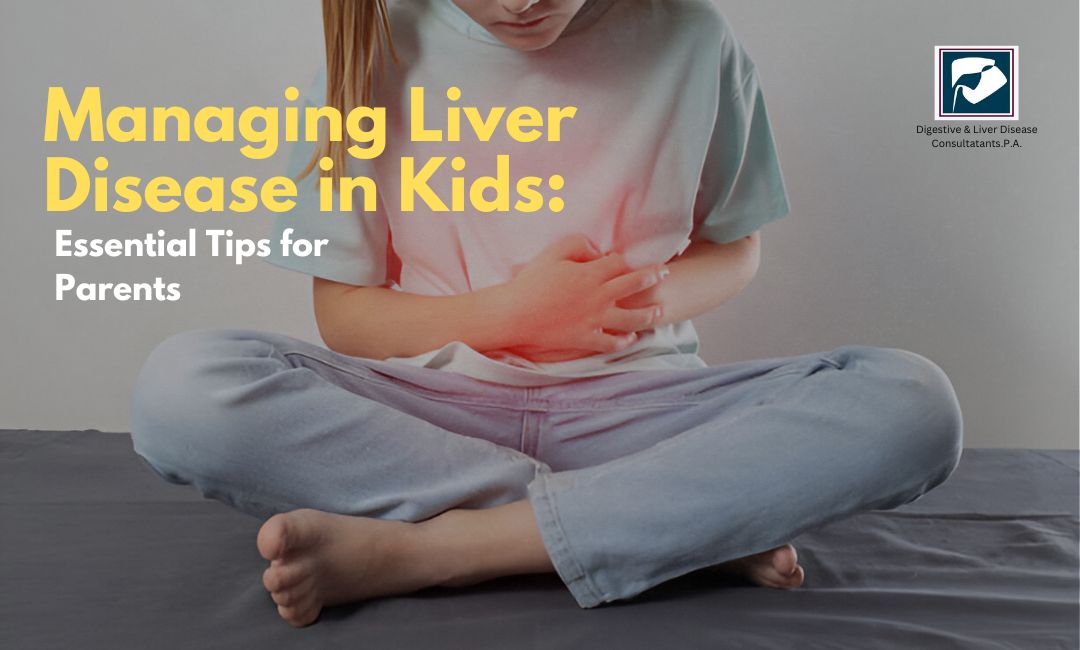Liver disease in children can be overwhelming and confusing for parents. Whether your child has been newly diagnosed or is managing a chronic condition, understanding the basics of liver health and supporting your child can make a world of difference. In this blog, we’ll share practical tips to help you navigate this journey while ensuring your child’s health and well-being.
Understanding Liver Disease in Children
The liver is one of the body’s most vital organs. It plays a key role in digestion, detoxification, and storing nutrients. When a child has liver disease, these functions can be compromised, leading to symptoms like fatigue, jaundice (yellowing of the skin and eyes), abdominal pain, and poor appetite.
- Common liver conditions in children include:
- Biliary Atresia – A condition where bile ducts are blocked or missing.
- Fatty Liver Disease is often linked to obesity and poor diet.
- Hepatitis – Inflammation of the liver caused by infections or autoimmune issues.
- Genetic Liver Disorders – Such as Wilson’s disease or Alpha-1 Antitrypsin deficiency.
No matter the type of liver disease, early intervention and proper management are key to preventing complications and ensuring your child’s growth and development.
Essential Tips for Parents
1. Partner with a Pediatric Hepatologist
Finding the right specialist is crucial. Pediatric hepatologists have the expertise to diagnose and treat liver conditions in children. They can develop a tailored care plan to suit your child’s specific needs. Regular check-ups and open communication with the doctor will help track your child’s progress.
2. Prioritize a Liver-Healthy Diet
Nutrition plays a vital role in managing liver disease. Here are some dietary tips:
- Focus on Balanced Meals: Include fruits, vegetables, whole grains, lean protein, and healthy fats.
- Limit Processed Foods: Reduce consumption of foods high in sugar, salt, and unhealthy fats.
- Stay Hydrated: Encourage your child to drink plenty of water.
- Avoid Trigger Foods: For some conditions, foods high in fat or certain proteins may need to be limited. Consult with a dietitian for specific recommendations.
3. Promote Physical Activity
Regular exercise helps improve overall health, including liver function. Encourage age-appropriate activities like biking, swimming, or playing outdoors. If your child’s energy levels are low due to their condition, start with gentle activities and gradually increase as tolerated.
4. Understand and Monitor Medications
Some liver diseases require medication to manage symptoms or slow disease progression. Keep a detailed list of your child’s medications, including dosages and schedules. Be vigilant about side effects and ensure you discuss any concerns with your child’s doctor.
5. Create a Supportive Environment
Managing a chronic illness can take an emotional toll on children. Here’s how you can support them:
- Open Communication: Talk to your child about their condition in a way they can understand.
- Build Routine: Establish a consistent daily routine to create a sense of stability.
- Seek Emotional Support: Consider therapy or support groups to help your child cope with their emotions.
6. Watch for Warning Signs
Liver disease can sometimes worsen without warning. Keep an eye out for symptoms like:
- Increased fatigue
- Severe abdominal pain
- Persistent nausea or vomiting
- Dark urine or pale stools
- Worsening jaundice
If you notice any of these signs, contact your child’s healthcare provider immediately.
7. Educate Yourself
The more you know about your child’s condition, the better equipped you’ll be to advocate for their needs. Ask your doctor questions, read trusted resources, and stay updated on new treatments or management techniques.
Lifestyle Adjustments for the Family
Living with a child who has liver disease often requires the whole family to adapt. Here are some ways to create a supportive home environment:
Plan Meals Together: Make liver-healthy meals a family affair. This not only helps your child but also promotes better health for everyone.
Be Active as a Family: Turn exercise into a bonding activity by going for family walks or playing games together.
Practice Patience: Managing a chronic illness can be frustrating. Be patient with your child and with yourself as you navigate challenges.
Celebrate Small Wins: Acknowledge and celebrate progress, no matter how small. This boosts your child’s morale and keeps them motivated.
Schedule an appointment today to discuss your concerns or to start a treatment plan tailored to your child’s needs.
Conclusion
Managing liver disease in children is undoubtedly challenging, but with the right knowledge and support, you can help your child lead a healthy, fulfilling life. By working closely with healthcare professionals, promoting a liver-friendly lifestyle, and fostering emotional resilience, you’re giving your child the best possible care.
Schedule a consultation with our pediatric liver specialists at DLDC to get the care your child deserves. Contact us now to start your journey toward better health.






